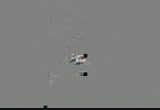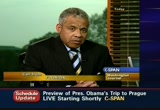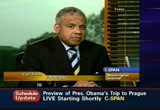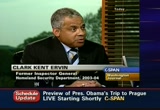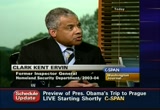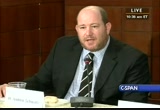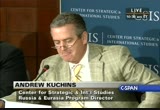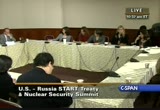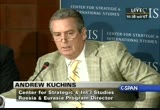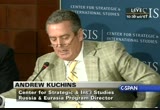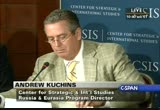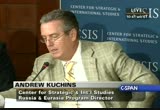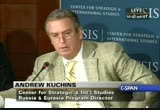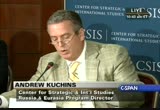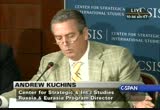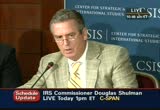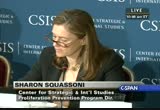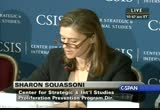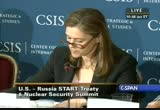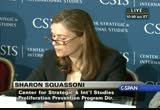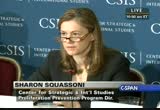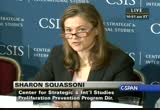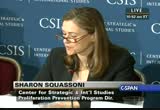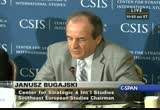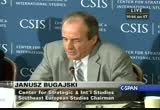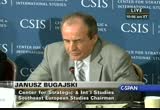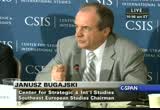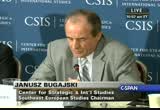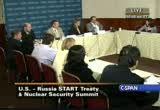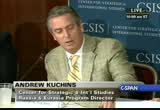tv [untitled] CSPAN April 5, 2010 10:30am-11:00am EDT
10:30 am
concern. mike and people like him would be subjected to more intense screening. he travels routinely to nigeria. he has not told it is body. that does not indicate a terrorist intent. -- he has metal in his body. host: back to how our allies and partners will greet these new rules. "the new york times" had a piece about the new plan going into affect. a member of parliament was quoted as saying making decisions on that basis, if that is not pro flight, what is that there is still some skepticism. guest: the term profiling is -- this is as far away from pro
10:31 am
fallen as we can get. the old system applied secondary screening, even when no most of those people from those countries are not involved in terrorism. we can improve beyond what we're doing right now. host: a democratic caller from miami. caller: i think executive order would be the best route for president obama to render to this country because the hypocrisy of the social conservatives have really dug a nail to what we're trying to accomplish world why. i think we need to proceed how much power he has to put in the secretary of the pstsa. that sends a message and i believe also that we are on
10:32 am
target. we cannot survive these tactics that the third world mentality implement when they sent the bombers into the country. i think we have a handle on many of these names. it's not like a conspiracy or the u.s. is involved in planning and plotting to do terrorism on the flights coming in. i think we put those to rest. in europe, but they are behind. we had all of the equipment in line and in place. we are on target. i would like for you to tell us what the latest is coming down the tube as far as executive order versus president trying to implement his program. guest: i don't quite follow that
10:33 am
question. we are not talking about executive order. host: heat may have been talking about -- the president made some 15 recess appointments. his second nominee at tsa. this is the headline. robert harding removed himself from consideration. it is not known whether the president has a third choice already. guest: at this point, it is almost the case it matters less who is named to that juppe then that someone is named. nearly two years, we need a confirmed nominee. i think the acting administrator has done a fine job. given the urgency, i would submit her name to the senate, presuming she is willing to serve. host: the tsa is known as the
10:34 am
second most hitting. even tom ridge had to wait in airport lines. guest: tsa is the one component of the agency that every american touches on an ongoing basis. depending on how frequently you fly. every american at one time, and many americans many times, have a direct interaction with that agency. often screeners aren't rude, but they seem complacent. it is a very tough job. sometimes travelers are rude to them. the hassle, turn elapses -- this has all given tsa a black eye. they want to restore morale at that agency. >> you can see "washington journal" every morning at 7:00
10:35 am
a.m. eastern. president obama is traveling to prague later this week. he will host a nuclear summit and it will be affected by leaders of over 40 nations. this panel will preview these events. this is live here on c-span. >> this briefing will be available later on facebook per it is also available, video and audio csis.org. for those who use itunes, this will be on the beyond campus section itunes university. my colleagues, andrew kuchins, janusz bugajski, and sharon squassoni some of the top experts in the world and they have a lot to say about things that are associated with this
10:36 am
visit. you will find an example of our critical questions. this is sharon squassoni's critical questions on the nuclear summit. this also be at csis.com. >> thank you. it is a great pleasure to be here. thank you for joining us. i promise i will not talk about my personal over-under and tiger woods at the masters, it up this week. the replacement treaty which will be signed on thursday, but i want to be aware of overselling the importance of this agreement. it is significant for the u.s.- russia relationships and also president obama's ambitious goals for nuclear security and
10:37 am
for the reductions in nuclear weapons. i do not want to oversell it. if we did not have this first step, both of those agendas would be severely hampered. it was important this agreement be reached before the nuclear non-proliferation treaty in may . my colleagues will talk more about that. a month ago, -- the agreement is important for political capital, domestically and internationally. when he was first elected, my sense was he had a chance to be one of the greatest presidents or an unsuccessful one-term president. it was looking more like the former than the latter. with health-care passing and the
10:38 am
start i tree, he is looking more successful. it is important for him abroad and how he is viewed by international leaders. for the relationship, for the reset, there have been three key issues that have been driving the desire to improve relations with moscow. the first is bent iran and the dirt -- the first has been iran and their nuclear program. this section has been afghanistan and the that they have placed on winning the war in afghanistan and there for the role of the russians play in providing supply and transit of materials to our troops in theater. the third is of course the nuclear security agenda which
10:39 am
is impossible to move forward on without their help. as we look at the 14 months since the obama administration has taken power, the u.s. best russian relationship has improved. it was a local bar. if it had not improved -- it was basically frozen after the war in georgia -- there was the danger of literally a new cold war. one of the achievements is the fact that there has not been another war in georgia in the last year and a half. i know my colleagues in the defense department and state department spent a lot of time on this issue and assuring this
10:40 am
does not happen. when they received a call about the tragedy on the bombing of the moscow subway, they were thinking there might be another war. this is a significant achievement. the relationship has been broadened with the establishment of the commission between secretary of state clinton and the working groups. this is important. most importantly, aside from no war in georgia, is there has been progress on the key security drivers. we have modest expectations about what we can get out of the relationship with russia. we're more likely to be not disappointed. when you look at these issues, our interests are not fully align.
10:41 am
let's look at the start 1 treaty. when we look at the reset button, this was talked about as the low lying fruit. the agreement was more complicated to reach than expected. there was danger a month ago. i felt the low-lying fruit might become the poisoned fruit. that has not become the case. first of all, for the president's to agree on this and tried to preach the deadline of december 5, 2009, that is awfully ambitious in the first place. if the russians viewed the have some levers with the obama administration, i think that the agreement was more important for them than it was for moscow and that led them to press hard at
10:42 am
the tail end of the negotiations. it seemed we never quite got beyond 97%. maybe this is the most important, this agreement between moscow and washington brings into the debate the whole relationship itself. the russians are still operating under a military doctrine which identifies the west as the number one risk or threat to their security. there are strategic -- our strategic outlooks are quite different. i think we have moved on from the cold war. for the russians, it is not quite in synch. it was clear some forces were exercising or obstructing the agreement at the tail end.
10:43 am
but we got it. the other. i would make is that for the role of nuclear weapons, there is asymmetry for washington and moscow. the deterioration of the nuclear weapons capability, is re important than the military doctrine. for us, but the reverse is true. i think that gets to the question of how difficult future agreements are going to big. the next round will be considerably tougher. let me say a word about the prague trip. in the meeting between mr. obama and mr. medvedev it, there'll be sanctions on iran and it will be imported to work got something closer to an agreement with the russians with language about sanctions before negotiating with the chinese. they will be in town next week
10:44 am
for the nuclear summit. broadly speaking, the strategy of the obama administration will be to convince the russians that it will be in your interest to have a better relationship with washington than one with tehran. think about your interests. if we are not able to reach a meeting of the minds on sanctions, other things -- possibly civilian agreement, even the ratification of start -- these will all be jeopardized on capitol hill where there's not a lot sympathy towards the russian spirit the russian strategy consisted -- sanctions has been to try to find a way to appear that their corporate with the the united states and our
10:45 am
allies while not having to make a hard decision. there was a big hullabaloo when mr. medvedev said they're not against sanctions against iran. the russians have already supported sanctions against iran in the un. the administration would like to try to regain some leverage in the u.s.-russia-china relationship. i think it is worth -- i think is appropriate to have modest expectations about the reset with the russians. when a look at that, i would conclude moscow's position is probably closer to us than
10:46 am
beijing. that is something to think about. thank you. >> i would like to introduce sharon squassoni. she is the director and senior fellow for our proliferation program. she just joined us from carnegie. this is her first briefing here at csis. >> thank you. i guess i am the functioning specialist here. i will talk about the nuclear security summit that will take place in washington next sunday. andrew mention the three-prong agenda at the president obama laid out last april in prague. nuclear arms control, nonproliferation, and nuclear security. this april summit next week takes place a month before the review conference of the nuclear nonproliferation treaty. it happens every five years.
10:47 am
president obama needs a big win. he needs something to gain more corp. and cooperation from other members of the treaty. i think the nuclear summit was designed with that in mind, having something that would be splashy, that would have style but also substance one month before this important review conference. we will have 44 heads of state. we will have the head of state from china and medvedev from india -- from russia and the prime minister from pakistan and mr. netanyahu from israel. iran and north korea will not show up. it will be a state dinner -- a heads of state dinner the night of april 12.
10:48 am
there will be two sessions that will focus on national measures and on international corp. to enhance nuclear security. more importantly, this is a big opportunity. not since 1949 has there been such a big gathering of heads of state. this will be an opportunity to discuss sanctions on iran, the other pressing bilateral issues, and some of these nuclear non- proliferation issues one month before that conference. on substance, it is trickier. one question i often get is, what will this cover? not everyone agrees on which material poses the biggest threat or how but the threat is. one of the functions of this conference will be to obtain greater agreement.
10:49 am
let's start with a couple of facts and i will leave time for your questions. there have been more than 1600 illicit nuclear trafficking incidence that have been reported to the ieae. not all have involved weapons usable material. what it demonstrates is that there is the market out there. there is interest in trafficking this material. this summer, when you look at the -- you cannot get weapons usable material, which is not just stockpiles but also in the civilian nuclear energy sector and research reactors. the third category is a radioactive materials that you find everywhere, hospitals. these are sources that are used for cancer treatments, those
10:50 am
kinds of things. some believe we should focus on those regular active materials because they are not well guarded. there are a target of opportunity for a terrorist. you cannot make a nuclear weapon with them. but you can make will recall a dirty bomb. many experts agree that is what terrorist would probably seek. this security summit next week will focus on the weapons- usable material. there is enough material, depending on who you talk to come up for between 120,000 weapons or 300,000 weapons. that range demonstrates right there that we need to do more. we need to exchange more information. there needs to be a lot more transparency.
10:51 am
this is a job that is for all countries, not just nuclear weapons states or nuclear weapon holders like india, pakistan, and israel, but for all states. going back to the agreement on what the threat is, one of the functions of the summit will be to get greater agreement on the fact that there is a threat, to get all countries to say, this is a problem. the white house hopes for four things that countries will be engaged, more aware, they will pledge to do something about this, the will adopt best practices, and that will provide assistance to other countries. the non-governmental organizations, that committee hopes for more. do not as focused on the existing regime, but two more,
10:52 am
consolidate, maybe eliminate these global stockpiles of material. i am going to leave your specific questions about what countries can do for the question and answer session, but this will be -- i just want to close with -- even if there is a communique that is full of flowery language about each country's commitment, even that will be helpful in this effort against nuclear terrorism primarily because we all know what to do, but we are lacking the political will to do it and get it done in the shortest amount of time. think you. >> i would like to introduce my colleague janusz bugajski. he is the director of our new european project. he will talk about this aspect
10:53 am
of the trip. >> thank you, andrew. good morning and welcome. i will be brief and focus on president obama's meeting with the central european leaders which is on thursday evening in prague for a dinner. president obama's planned meeting with 11 leaders from the new democracies, the new nato allies, is intended to demonstrate that relationships have not been reset for have not been downgraded, which is the way it is perceived in some parts of the region. despite attempts to upgrade relations with russia, the u.s. will not. there will weaken their commitments to the security guarantees.
10:54 am
withdraw from europe. agree to any revision of the continent into blocs. closed the door to further nato enlargement eastward. and make any grand bargain with moscow over the heads of former soviet satellites in central eastern europe. the very fact such research needs to be emphasized indicates several capitals in the region remain troubled. not just about russia's aspirations but about u.s. and nato policy towards russia. there are several landmark developments ahead that will prove significant for the new allies. they will be discussed at the dinner. countries that are seeking assurances and an upgrade of nato's six . commitments. the framing of nato's new
10:55 am
strategic concept, which is being worked out as we speak, and how russia is interpreted and depicted in the document. nato summit in lisbon in november and what commitments are made to mutual defense and nato's role over the coming decade. is it a global nato? is it nato back into the basics that there are different views on how this should be structured. the contours of the misfiled defense system. president obama canceled the bush version. he has talked about his alternative vision to which several countries have already signed up, including romania and possibly bulgaria. the question there is, how will this be integrated? how will pressure and will
10:56 am
russia -- how will pressure and will russia be included? it is worth remembering that one of the reasons prague signed on to the bush version was not so much defense against iran but to try to establish a link with the united states. this was at a time when doubts were growing. several countries reset their relationship with russia to quite warm. this troubled some countries in the region. the central states bordering russia are concerned about russia's ambitions, including georgia and the possibility of another war in georgia. it is not to be discounted. the pressure moscow cannot exert even on their own security,
10:57 am
pritchard the league with the more vulnerable three baltic states. as proof of the defense guarantees, they have pushed for contingency plans for the defense, which is now taking place for the three baltic states, to stage more regular exercises, not just air exercises. russia has stage provocative exercises last year but next to the polish and baltic borders. nato did not respond. this is why the deployment of a battery of patriot missiles with a small american contingent in northern poland is considered extremely important because it ties in a note to the defense of these countries.
10:58 am
they want greater clarity as to help nato countries interpret article 5, which is subject to some debate. and proved the alliance's -- let me stop there and see if you have any questions. >> we will open it up to questions now. >> thank you. i am with bloomberg news. could you elaborate? you talked about the political capital the president has and the capital he has with european leaders because of the start treaty and how that will play out with other issues, other nuclear issues this year and looking forward. -- in looking for. >> that is a great question. it is hard to quantify. i think given the success that
10:59 am
the administration has experienced in the last month, international leaders have to regard the administration as one which is -- there was a broad tendency, i think, to come up you know, they are weak and discount it. we may not be dealing with this guy in 2012 and beyond. i think that calculation has to look different now than just a month ago. how it is going to play out on -- how will it play out on the side of the sanctions on iran, and i think behind the scenes, the administration has
265 Views
IN COLLECTIONS
CSPAN Television Archive
Television Archive  Television Archive News Search Service
Television Archive News Search Service 
Uploaded by TV Archive on

 Live Music Archive
Live Music Archive Librivox Free Audio
Librivox Free Audio Metropolitan Museum
Metropolitan Museum Cleveland Museum of Art
Cleveland Museum of Art Internet Arcade
Internet Arcade Console Living Room
Console Living Room Books to Borrow
Books to Borrow Open Library
Open Library TV News
TV News Understanding 9/11
Understanding 9/11